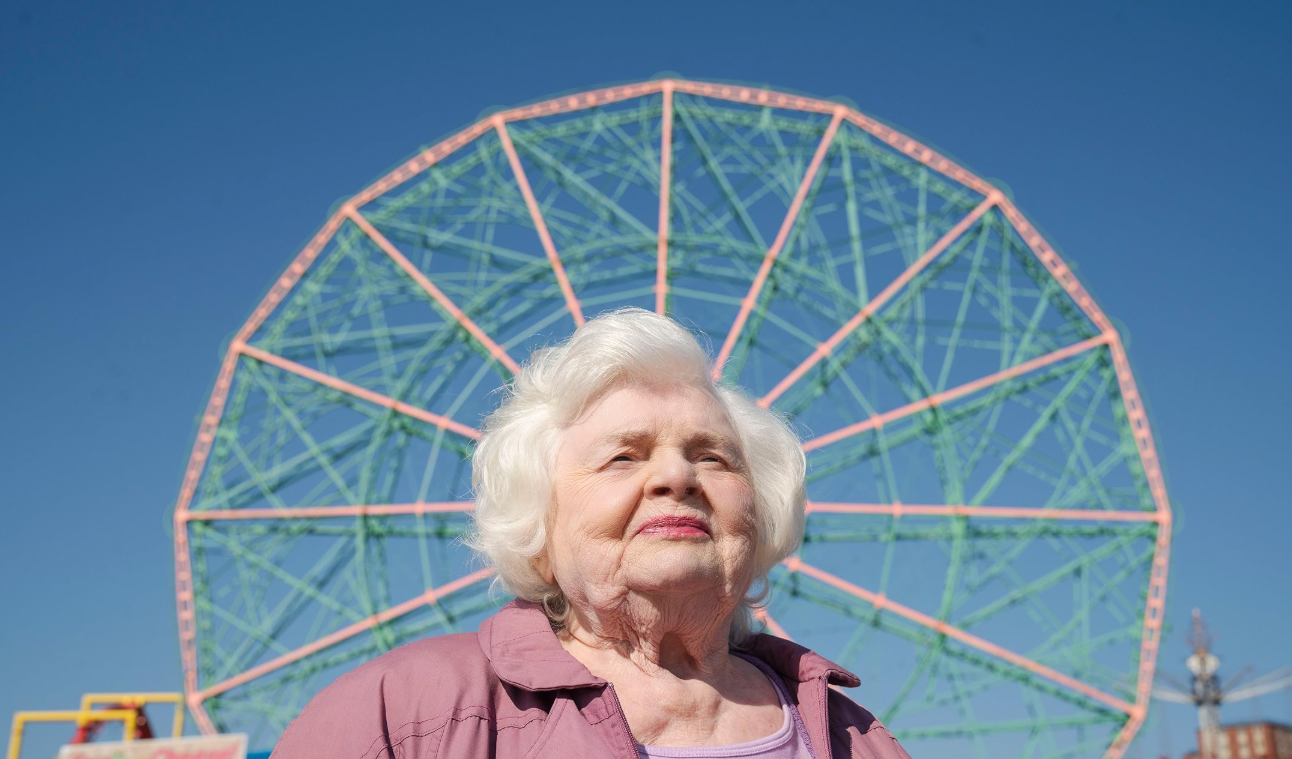Image courtesy of Sony Pictures Classics
ELEANOR THE GREAT— 4 STARS
LESSON #1: HINGING A CINEMATIC JOURNEY ON A LIE— Eleanor the Great, the directorial debut of Scarlett Johansson featuring Academy Award nominee June Squibb, hinges on a narrative driven by a lie that grows problematic as it is perpetuated. From a storytelling standpoint, there are two ways for film to pull that off. Either we, the audience, are in on the lie from the start, where a dramatic irony stews as the plot continues. Or, the lie is hidden, creating a potential rug pull revelation that tests our acceptance of the characters and the lie itself. Eleanor the Great’s screenwriter, Tory Kamen from TV’s The Mick, took the former route, and it was the right choice for this material.
The film introduces Eleanor (Squibb) and Elizabeth, better known as Bessie (Rita Zohar of Amadeus and The Last Love of Laura Adler). They are two roommates of an advanced age in Florida who enjoy a very strong friendship. Their respective husbands have passed on and their families have gone their own ways. They are individual in their manners and identity—Eleanor exudes an irascible gear of patronizing forcefulness of getting her way while Bessie is the kindly saint type—yet inseparable as companions. Between them, Bessie is a Holocaust survivor (matching the actress herself who was born in a concentration camp in 1944). Still in her nineties, she is often woken up by nightmares and jarring memories. The only person Bessie has ever told her full history to is Eleanor, not even her own family.
After Bessie succumbs to old age, the now-alone Eleanor makes the choice to move in with her daughter, Lisa (Breaking Bad cast member Jessica Hecht), and grandson, Max (Will Price, also seen this awards season in Luca Guadagnino’s After the Hunt). She remembers her Bronx old haunts fondly, but living with Lis and Max is a challenging transition from her former independence and close kinship with Bessie. Lisa gets her membership to the JCC of Manhattan West community center for its senior programs to help Eleanor meet new people. One of the first sessions she stumbles into is a Holocaust survivors support group.
This is where the grand lie germinates in Eleanor the Great. Flustered slightly to be there and trying to gain a feeling of inclusion and acceptance alongside the untold stories being shared, Eleanor starts to tell Bessie’s story as if it was her own. As Eleanor speaks and composes her thoughts, Johansson layers asides of flashback to show Bessie telling her story to Eleanor’s patient ear, backed often by composer Dustin O’Halloran’s sumptuous piano-forward score. Sitting in on the support group is Nina, played by The Green Knight’s Erin Kellyman, a NYU journalism student working on a long-term project. Nina is captivated by Eleanor’s “story,” and seeks her out to become a featured source for her documented work.
LESSON #2: WOMEN TALKING ACROSS GENERATIONS— On paper, these two women separated by decades and identities, shouldn’t click in Eleanor the Great, but they do, beautifully. Kellyman and Squibb share several quaint and pleasant scenes where the comfort levels amid these very different women—both going through a period of mourning—blend together, all through the power of frank conversation and good quality time. Esteemed French director of photography Hélène Louvart (and absolute get for Johansson) enhances the palpable chemistry on screen with an observant and lingering eye to make the most of these rich moments.
As Eleanor’s new friendship with Nina develops and spreads to her TV journalist father, Roger (the fantastic Chiwetel Ejiofor), the audience’s awareness in Eleanor the Great of the ongoing falsehood starts and festers as wariness. Nina is in a fragile place, where we can tell this lie is going to crush her and increase disappointment with Roger. The questions now center on best intentions from Eleanor’s fabrication.
LESSON #3: EMPATHY FROM DRAMATIC IRONY— Thanks to the dramatic irony established from the beginning, there’s time in Eleanor the Great to mindfully sit back and see how Eleanor’s deception is handled. We realize that if Eleanor didn’t tell Bessie’s story, it would be something—complete with the existence of people with no living records—lost to time. There’s undoubted bravery to telling these stories, even if they are not yours, and talking before it’s too late. Such a thing is a delicate lie, something certainly heavier than a little white one, but not monstrous until it is wrongly capitalized. In a way, the deception is more tolerable if the reason is pure. Bessie’s story, hauntingly presented in those repeated flashbacks from Rita Zohar’s emotional monologues, is as important as it is interesting.
You’re not human if you’re not caught up in the harrowing and painful details of her memories. Sure, there’s a version of Eleanor the Great where the baton could have been passed to Zohar for Bessie to solely tell her own oral history, but we get both with June Squibb putting forward excellent, emotive work as a vessel going through her own parallel sorrow. The nonagenarian who dazzled us last year with Thelma shoulders this challenge with tremendous grace.
LESSON #4: FORGIVENESS FROM DECEPTION— Because of the strong empathy generated in Bessie’s story, from her own lips or Eleanor’s, we warm to this mistake of the latter not to identify as a proxy from the start. Since it would have been easy for her to navigate this predicament better as a respectful secondary source instead of primary one, a semi-unrealistic concession to the central conflict is asked of Eleanor the Great’s audience. Exposure has to happen without ruining Bessie’s important story, and it’s up to Eleanor the Great to answer that need for forgiveness with proper gravity. Yet, folks are going to weigh the ease to forgive.
It all circles back to the dark places caused by grief as it is paced by Eleanor the Great. Eleanor carries it for her late friend and wants, through this known falsity, to help her memory live on. As it stands, Nina and Roger’s shared familial heartbreak is unresolved, manifesting fearfully and differently as a husband and a daughter, and re-opened by bearing witness to Eleanor’s actions. Thanks to a strong third act monologue from Ejiofor speaking on approaching loss as the “inevitable outcome of the love that unites us all,” we want what we he wants and have to remove cynicism to accept that outcome from Johansson’s film with warmth. There’s plenty for the new director to be proud of and a high value to being a mouthpiece for human connection as this film intends.
LOGO DESIGNED BY MEENTS ILLUSTRATED (#1339)



